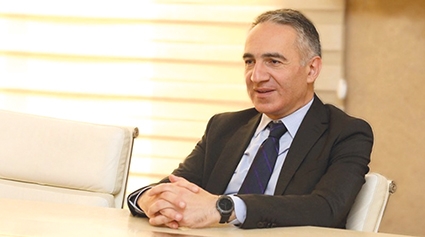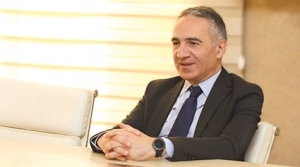Minister of Education Gets Personal
This week, the Ministry of Education, Science, Culture, and Sports published an interview with Minister Mikheil Batiashvili. Questioned by education reporter Nato Ingorokva, Batiashvili got personal.
When Batiashvili was first appointed to the post in July by Prime Minister Mamuka Bakhtadze as part of a massive cabinet reshuffle, critics accused him of lacking a solid plan to lead the newly combined ministry (formerly the Ministry of Education and Science, the Ministry of Youth and Sports, and the Ministry of Culture and Heritage Protection). Particularly on social media, people criticized him for making statements seen as overly vague and for using doublespeak. Not long after, however, he revealed himself to be a zealous reformer.
Batiashvili says he is inspired everyday by an encounter he had several years ago. One morning, on the way to work, he shared the elevator with his neighbor's young son. “I asked if he was happy to go to school,” Batiashvili explained, “whether he liked school. He responded with childish honesty: ‘Do you think any kid is happy to go to school?’ These words are still in my mind and I'm constantly reminding myself of that interaction.”
When asked why he accepted the position, he pointed to his experience in education, which includes working as an associate professor and the establishment of ‘Silicon Valley Tbilisi’ and founding and leading the University of Business and Technology. Batiashvili said that, “Problems and challenges in the system were not really foreign to me. When you can look at a situation close to your heart from the outside, you can see the shortcomings more clearly. I have talked over these issues with my colleagues, Georgian and foreign, many times, and when I was offered a ministerial position, I thought that I really wanted to take part in the reforms needed for the education system. Generally, when you don’t like something, and you have a chance to improve it, you shouldn’t wait for someone else to take responsibility for it.”
In mid-September, the Prime Minister announced a new strategy for the education system, alongside Batiashvili. To counter problems facing Georgia such as occupied territories, poverty and social problems, “Modernizing the system of education, the development and introduction of a strong fundamental educational system, is the main precondition,” Bakhtadze said while presenting the new strategy.
A common refrain from both Bakhtadze and Batiashvili is that “education is the priority of the country.” Explaining what that means to him, Batiashvili said “the state recognizes the unconditional significance [of education], supports reforms, empowers financial and human resources – and not only...The priority is to help the public see that education will give you a decent life, to believe that knowledge and skills that are acquired at school or university will help you for future self-realization and provide for your well-being.”
He also noted that there are urgent problems, including textbooks full of mistakes, which he promised will be remedied in the near future.
Batiashvili touched on school safety, a key issue of concern among the public after the after-school Khorava Street Murders in December last year. “A parent should believe their child is in a safe environment [at school]. In order to create such an environment, it is necessary to consider the role of the School Resource Officer, school psychologist, and, most importantly, parents and school leadership,” said Batiashvili. He emphasized the importance of all parties being actively involved and cooperative.
The Minister addressed one of the most striking problems in the Georgian education system – teachers. The “profession [of teaching] should not be chosen only because [a person] cannot find any other job. When you love what you do, you will pass this joy to others. Teaching is a very difficult profession, so the choice should be thoroughly thought out. Naturally, this hard work should be appreciated properly – in terms of salary and teachers’ social status. We said that by 2022, the minimum teacher's salary should be 1500 GEL. It is very important to attract new people to the profession.” Currently, the average teacher’s salary is around 500 GEL ($185) a month.
He also emphasized that “no school environment, no modern technologies can produce the desired result if the educational system has been deprived of values. The teacher must be the one who, along with academic knowledge, teaches students values by personal example or through the development of different skills...otherwise a better society cannot develop.”
In 2019, a new model of learning, combining international best practices with the Georgian environment, along with Georgian scientific and pedagogical experience, will be launched in 50 public schools. By 2030, the new model will be fully adopted by more than 2,000 schools.
Phase 2 of the reforms will be implemented in 2020-2023. Joint programs with international universities will be introduced and the number of foreign students in Georgia will increase by 50,000.
By Samantha Guthrie
Image source: Ministry of Education, Science, Culture, and Sports












